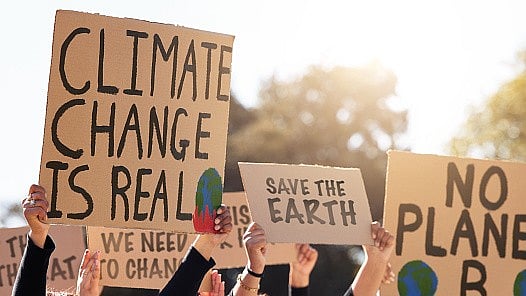
Representative image of climate change protest.
Credit: iStock Photo
As the world grapples with the tangible effects of climate change, an often-overlooked aspect is its impact on mental health.
A recent report shared with BBC 100 Women sheds light on this issue, revealing a marked increase in Google search queries related to "climate anxiety."
This term, encapsulating the distress caused by climate change, is becoming a significant concern, especially among women, who are reported to experience it more acutely than men.
The rise in climate anxiety is a response to the visible signs of climate change, such as intensifying wildfires, floods, and droughts.
While these physical manifestations are regularly reported, the mental repercussions receive less attention.
However, the concern is not limited to any specific demographic; children and young people worldwide are also increasingly experiencing climate-related distress.
Data from Google Trends indicates a striking increase in the number of searches about climate anxiety.
In the first ten months of 2023 alone, English-language searches for this term were 27 times higher than in the corresponding period in 2017.
This trend is not just evident in the English-speaking world; significant increases have also been observed in other languages.
Portuguese language searches have escalated 73 times, Chinese language searches have increased by eight and a half times, and Arabic searches have risen by a fifth.
These findings, reported by BBC, highlight the need for greater global awareness and resources to address the mental health impacts of the climate crisis.
The escalating interest in climate anxiety underscores a broader concern about environmental changes and their effects on human well-being, extending beyond physical health to encompass mental and emotional health.
Google hasn't shared gender-specific data for searches on "climate anxiety."
However, a study published in the journal 'Sustainability' titled 'Psychological and Emotional Responses to Climate Change among Young People Worldwide: Differences Associated with Gender, Age, and Country' found that women generally experience more climate anxiety than men.
This global study, involving 10,000 participants aged 16 to 25 from 10 countries, revealed that female participants exhibited higher levels of concern and negative feelings towards climate change.
In contrast, male participants tended to be more optimistic and had more trust in governmental actions regarding climate issues. The research was conducted through an online survey in 2021.
As the world continues to confront the challenges posed by climate change, it is imperative to acknowledge and address the psychological toll it takes on individuals.
This rising trend in climate anxiety calls for a concerted effort to provide support and solutions that address not only the environmental but also the mental health challenges posed by the climate crisis.
